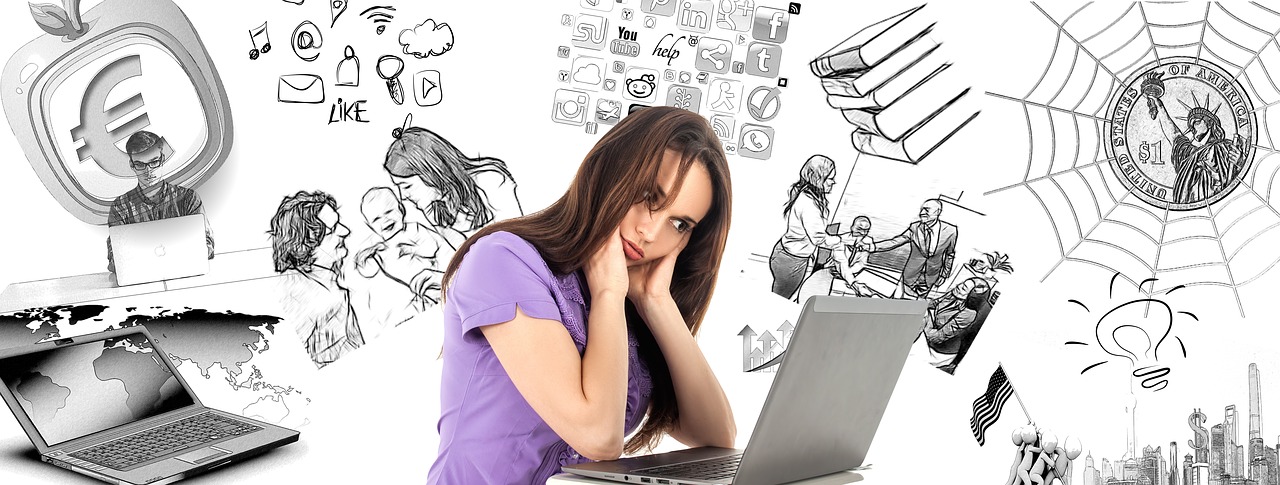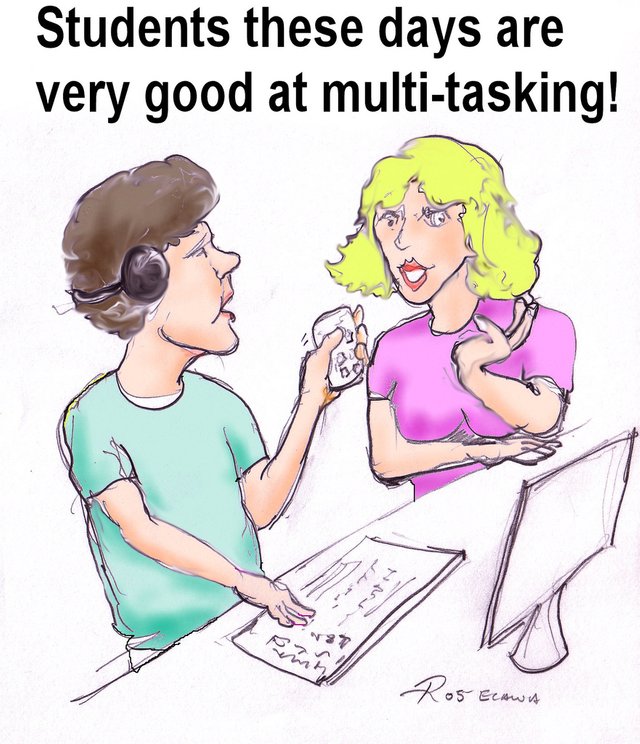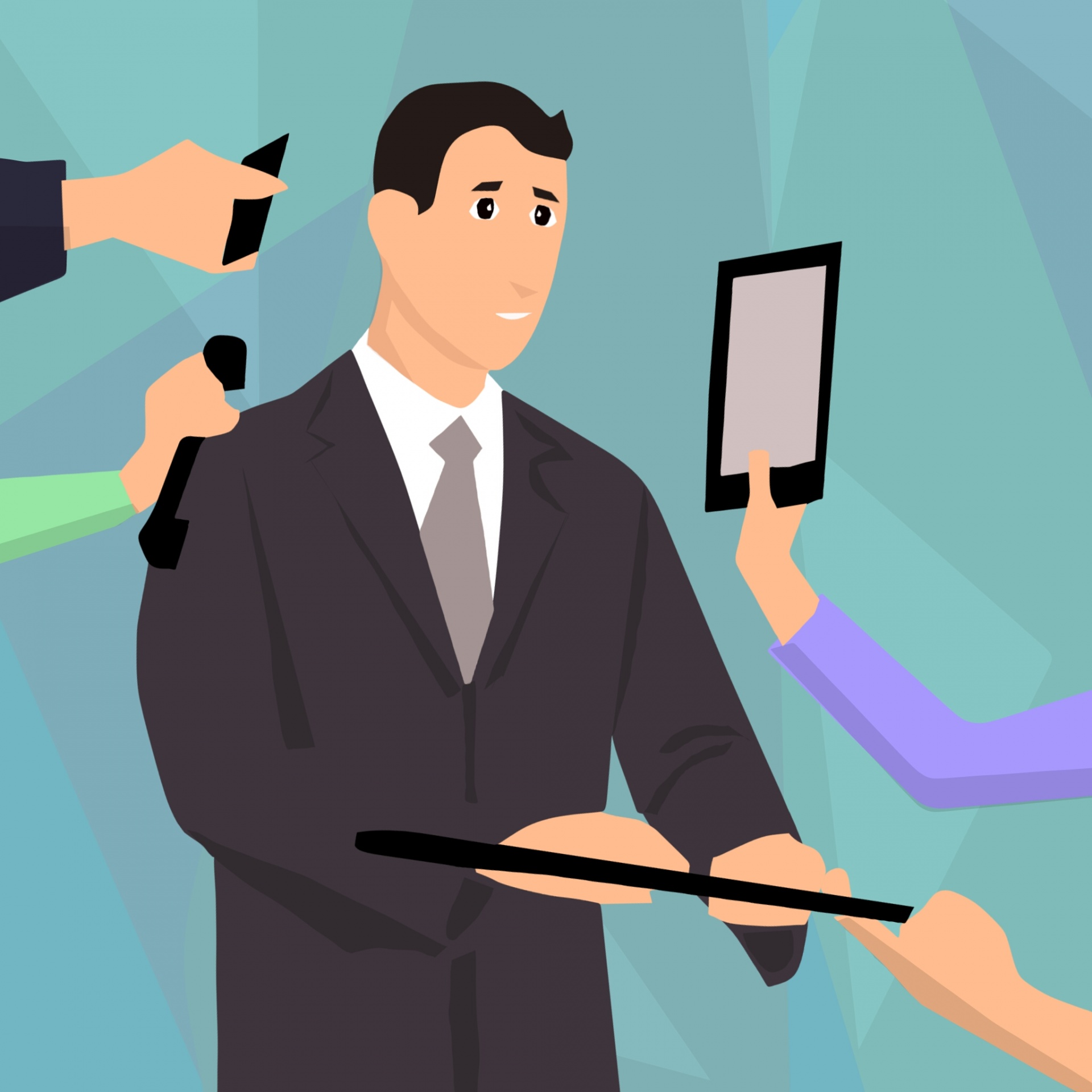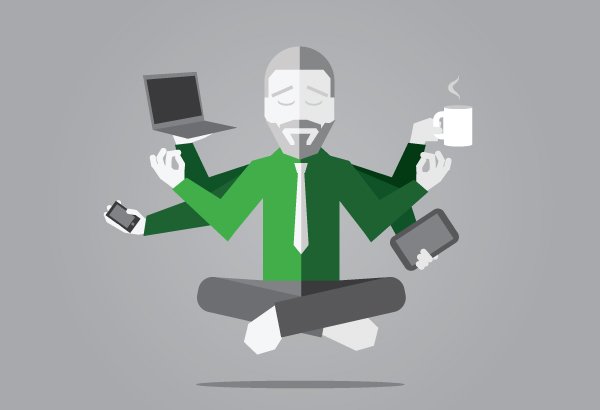Debunk-Tuesday – The Myth of Multitasking
Every Tuesday I am going to address one specific myth, urban legend, conspiracy theory or piece of pseudo-science. This time it’s about the idea of human multitasking and how your brain handles it.

Source
Hello, Mr. Multitask
Do you know those kind of people, who are bragging all the time about how good they are at multitasking and that they are so much more efficient in everything they do because of it? I bet you do. And if you are as annoyed by those people as I am, after reading this article you can prove them wrong.
But let’s establish a working definition of “multitasking” beforehand:
It can be understood as the ability of performing at least two or more tasks in the same time-period. This can happen either sequentially (switching between tasks) or in “parallel” by executing tasks in rapid succession (you will notice, that none of it is really simultaneously) (Dzubak, 2008) (1).
This definition differs quite heavily from the one most people are used to. They describe this process mainly as “doing two or more things at the same time”. This is, however, not consistent with the available scientific research at this topic and thus I will not use it.
After we know now more about the “what”, we can look more deeply into the “why”.

Source
Your brain on speed – or not?
So, what happens with your performance, when you are multitasking?
Again, most people tend to think, multitasking increases your efficiency of performing the given tasks. Therefore, it pains me to disappoint you.
The available research regarding multitask performance paints an incredibly clear picture of how mistaken the common conception is in the end. Not only is multitasking not increasing your efficiency but actually is diametral to your overall performance.
For example, Hembrooke and Gay (2003) (2) were able to show, that students which used their laptops to browse to (non)-course-related-content performed significantly poorer on follow-up tasks. Sure, this would have been hardly surprising, if it were only true for the participants who were browsing content, which was not relevant for the class. But even if participants dug deeper into the topic of class with the help of the internet, it did not lead to better test performance.
As soon as the browsing sessions were shortened the overall performance of the students increased as well. It appears to be the case, that the divided attention and the task switching were indeed not beneficial to those who tried it.
But those findings hold not only true for class time. In their study about the usage of information and communication technology (ICT) during schoolwork and out of class learning Junco et al. (2012) (3) were able to show similar results. Especially the use of Facebook and texting while performing schoolwork were associated with a negative impact of the overall GPA. Interestingly though, talking on the phone, emailing or using IMs showed no relation to overall GPA.
However, the detrimental outcome for Facebook and texting during schoolwork are still there. Junco et al. are explaining this due to the limits of essential processing (4) (making sense of study material) and representational holding (construction of coherent verbal or pictorial representation based on sensory input), because the working memory is struggling to pay enough attention to different stimuli.
The explanation, why phone calls, emailing and IMs are not related to GPA score is somewhat difficult. In their study Junco et al. are trying to address this properly with pointing out, that the focus on the “how is a technology used” seems to be a good indicator for predicting GPA scores. The students who use Facebook mainly for collecting and sharing information had better academic outcomes than the ones who used it mainly for socializing. Using emails and searching can be, however, defined as academic work, because the communication with their professors takes place mainly via email. Although phone calls are socializing activities, only very few students actually used them during schoolwork, so the available data is not extensive enough to make a proper prediction.
It is important to notice, that it is still impossible to determine the causal mechanism between the usage of ICT and their impact on overall GPA. But at least some degree of correlation seems to be evident.

Source
A way out
Of course, we are living in a globalised, digital, information-packed world. It is nearly impossible to avoid task switching at all. But there is hope, at least some.
You can learn different strategies of dealing with this kind of information overload. To enhance your ability to do this is getting more and more important, because the number of possible distractions is constantly increasing and if unattended, they can be really harmful for your workplace (Dawe & Toms, 2006) (5) or even your health (Speier et al., 1999) (6).
Several scientists have proposed different kinds of management strategies to cope with distractions. For example, Dawe and Toms (2006) addressed a set of four stages for dealing with interruptions:
- Detection – There is a distraction.
- Interpretation – What is the distraction?
- Integrating – Integrate the distraction into the primary task.
- Continuing – Keep on working at the primary task.
It is, of course, important to notice, that the managing strategy should not be more disruptive than the interruption itself, as McFarlane and Latorella already correctly pointed out in 2002 (7).

Source
Conclusion
The findings of the research regarding multitask performance came to not much surprise for me after all.
It was kind of obvious, even right now: when I was writing the first paragraphs of this article, I “watched” a Dota 2 stream on my third screen and although I switched back and forth quite rapidly, it took me way longer to write something useful than it should have. This seems trivial but is important to know. The same loss of performance appears not only in (or outside) classrooms and learning situations, but in other tasks as well. There is a good reason, why using a phone and driving a car at the same time is generally considered as a bad idea. The time it takes for switching between those two tasks can be crucial for avoiding an accident and no matter of how well you think you are able to perform in multitasking – you are most probably worse in comparison to sequential tasks.
But there is, at least to some degree, a tiny piece of hope for the multitasking geniuses among us:
In 2015, Adler and Benbunan-Fich (8) were able to prove, that multitasking is indeed detrimental for overall performance at complex tasks (no surprise here) but can lead to a significantly improved performance when the task is considered easy.
So next time, you are bragging about your amazing multitasking-ability keep in mind, this might be only because the things you do are quite easy anyway and therefore it’s not that impressive after all.
Feel always free to discuss my ideas and share your own thoughts about the things I’m writing about. Nobody is omniscient and if we all walk away a bit smarter than before, we’ll have achieved a lot.
Thanks for reading and stay smart.
Ego

Make sure, to check out #steemstem for more science related content.
References
(1) Dzubak, Cora M.; Multitasking: The good, the bad, and the unknown. 2008.
(2) Hembrooke, Helene; Gay, Geri; The laptop and the lecture: The effects of multitasking in learning environments. Journal of Computing in Higher Education. September 2003. Volume 15. Issue 1. 46–64
(3) Junco, Reynol; Cotton, Shelia R.; The relationship between multitasking and academic performance. Computers & Education. Volume 59. Issue 2. September 2012. 505-514
(4) Cognitive Theory of MML Continued
(5) Dawe, Emilie; Toms, Elaine G.; The Effect of Interruptions on Knowledge Work. 7th World Congress on the Management of eBusiness. July 2006
(6) Speier, Cheri; Valacich, Joseph S.; Vessey, Iris; The Influence of Task Interruption on Individual Decision Making: An Information Overload Perspective
(7) McFarlane, Daniel C.; Latorella, Kara A.; The Scope and Importance of Human Interruption in Human-Computer Interaction Design. Human–Computer Interaction. Volume 17.2002. Issue 1
(8) Adler, Rachel F.; Benbunan-Fich, Raquel; The Effects of Task Difficulty and Multitasking on Performance. Interacting with Computers. Volume 27. Issue 4. 1 July 2015. Pages 430–439.
a fascinating read. Thank you for taking the time to put this together I really enjoyed reading it.
I think your article is focusing too much on intellectual processes. There are many kinds of tasks that fits well to multitask - knitting while watching TV (I took up knitting while I was in the military ... just to avoid going crazy ... knitting while watching the radar screen all until some female officer decided I was not allowed to do that. Of course, I got quite many comments from the other soldiers, after all knitting is a very unmanly thing to do). Talking with a friend while picking blue beries or jogging. Driving while listening to music or some audio book. Etc ...
I disagree. You only have the illusion of doing multiple tasks at once, but in reality your focus is divided, which has a detrimental effect on your overall performance.
As far as I can remember, there are indeed some studies looking into this exact thing. Sure, listening to music does not affect you as much as listening to an audio book or even having a phone call. But I am quite sure, if you would test your driving skills in a lab while doing any of these things compared to an undivided attention - you will be surprised.
Research has indeed shown that one becomes a much worse driver when trying to do a telephone conversation, a but the same effect is much less pronounced when having a conversation with a passenger. The passenger is able to read the traffic situation and won't demand immediate answers to tricky questions while there traffic requires full attention. I'm not aware of any research on driving and audio books.
Does it actually matters weather one is a more clever driver when not diverting attention to an audio book? I think not, for simple driving 100% concentration is simply not needed - and if the audio book keeps one from falling asleep due to boredom, it may even be safer. When arriving in some unknown city and full concentration is needed, it's always possible to press the pause button.
Knitting too - almost for sure one can do a better task by giving it 100% attention, but most experienced knitters will be able to do a good enough knitting job while watching a movie.
I'm quite sure there exists lots of complementary tasks that fits well together, knitting and watching a radar screen seems to be such a combination. At the other hand, reading a book and replying to messages is obviously not a good combination.
The truth is we need to and we do multitask all the time and we cannot n we never multitask in the strictest sense.
Every task includes a lot of tasks. For e.g., I need to think, type and read while writing this comment. Is this one task or three tasks? Even thinking, I need to recall, rationalize and clearly define what I am thinking. So, is thinking one task or multiple tasks.
We cannot perform a single task without multitasking.
However, there is a difference of focus n goal.
How many different goals you are trying to accomplish at the same time?
For instance, you cannot play football on the field and study for exam at the same time. What you can do is recall import points of the subject while looking at the football and waiting for your chance to grab it. It is multitasking in a way, but if you get too absorbed into thoughts related to your exam subject, you might not be able to make the right moves to tackle and get the ball.
Focus is the key. If you truly do something with great focus, you will always be efficient in what you do.
If you are truly focused while learning about your subject, you will not forget anything. Focus is the key. Multitasking will almosy always make you compromise on your dedication towards a task.
I agree. For me it was important to point out, that there is no "real" multitasking in the sense of doing things at the same time. We are switching our attention (or focus) really fast - and this can lead to disadvantages.
With more concentrated focus, we are therefore able to achieve better results.
I read something else last week about multitasking
and how it is really "task switching." Our brains can't
really do more than one thing at a time so we are
simply moving from one thing to the next without
getting good results on any one thing.
Like you said, the loss of performance is huge and we
need to address this useless habit!
Yeah, a lot of people are thinking, that our brain works always like a computer and is therefore able to process multiple tasks at once. Beside of not being true, they actually sabotage themself with doing it, so it's important to be aware of the disadvantages it brings to you.
Thanks for your input!
I had already read about multitasking, but this serves to remind me again, well I have to remember it constantly haha.
cheers!
This post has received gratitude of 2.48 % from @appreciator thanks to: @egotheist.